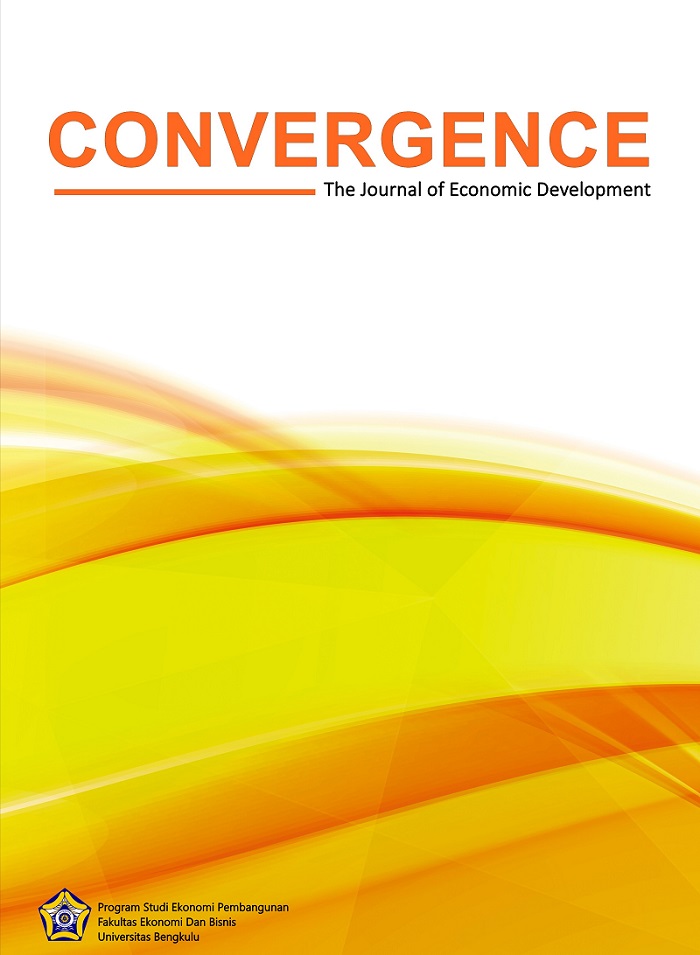Main Article Content
Abstract
This study aims to determine the Level of Efficiency in Education Expenditures in 34 provinces in Indonesia. The type of data used in this study is the cross-section data for 2017. The use of budget input as an input variable and student-teacher ratio (RGM) as an output variable. This study uses descriptive analysis with analysis of Data Envelopment Analysis using the assumption of the Return to Scale (VRS) variable and the model used for input (input-oriented) input. The results of this study indicate that the general facts of large provinces in Indonesia are still very few that reach the level of efficiency in technical costs. Already 3 provinces have achieved efficiently. This proves there is still waste in education spending suggestions that can be submitted in this study about the local government to evaluate the use of education which must be adjusted to the number of teacher and student ratios in each region so there is no need to waste and local government can improve.
Keywords: Efficiency, Education Expenditures, Data Envelopment Analysis, Cost Technical
Keywords
Article Details
- This statement is a commitment from the author, to respect copyright, both in terms of quoting the work of others, as well as in the use of journal content.
- If needed, the author can send a statement of authenticity of the manuscript. With the receipt of an article by the Editor of Convergence: The Journal of Economic Development, the article submitted has the copyright held by Convergence: The Journal of Economic Development Convergence:
- The Journal of Economic Development has the right to reproduce and distribute articles that have been published in journals.
- The author is not permitted to publish the same article that has been published in this journal.
References
- Afonso, Antonio and Miguel St. Aubyn. 2005. Non-parametric Approaches to Education and Health Efficiency in OECD Countries. Journal of Apllied Economics, 3. (2): 175-185.
- Coelli, T. J., 1996. A Guide to DEAP Version 2.1: A Data Envelopment Analysis (Computer) Program. CEPA Working Papers No.8, Department of Econometrics, University of New England
- Cooper William. Lawrence M Seiford and Joe Zhu. Chapter 1 : Data Envelopment Analysis: Histor, Models and Interpretations
- Dumairy. 1999. Perekonomian Indonesia. Yogyakarta: Erlangga.
- Ghozali, A. 2000. Pendidikan: Antara Investasi manusia dan Alat Deskriminasi. Jurnal Pendidikan dan Kebudayaan. 23 (V): 57-85.
- Haryadi, Arinto. 2011. Analisis Efisiensi Teknis Bidang Pendidikan (Penerapan Data Envelopment Analysis). Jakarta: Program Magister Perencanaan dan Kebijakan Publik Unversitas Indonesia
- Mangkoesobroto, G. 1993. Ekonomi Publik Edisi III. Yogyakarta: BPFE.
- Mardiasmo. 2002. Akutansi Sektor Publik, Andi: Yogyakarta
- Mills, A. dan Gilson, L (terj). 1990. Ekonomi Kesehatan untuk Negara-Negara Berkembang. Jakarta. Dian Rakyat, Jakarta.
- Mulyadi. 2003. Ekonomi Sumber Daya Manusia dalam Perpsektif Pembangunan. Jakarta : PT Raja Grafindo Persada.
- Nordiawan, Deddi, dan Ayuningtyas Hertianti. 2010. Akuntansi Sektor Publik. Jakarta: Salemba Empat.
- Nurkolis. 2002. Pendidikan Sebagai Investasi Jangka Panjang. (Online) https://www.scribd.com/doc/200585703/Artikel-Pendidikan-Sebagai- Investasi-Jangka-Panjang
- Pemerintah Indonesia. 2003. Undang-Undang No. 20 Tahun 2003 tentang Sistem Pendidikan Nasional. Lembaran RI Tahun 2003, No. 20. Jakarta : Sekretariat Jakarta
- Prasetya, F. (2012). Modul Ekonomi Publik: Teori Pengeluaran Pemerintah. Malang: Universitas Brawijaya.
- Prasetyo, Ahmad Danu and Ubaidillah Zuhdi. (2013). The Government Expenditure Efficiency towards the Human Development. Procedia Economics and Finance (5), Hal. 615 – 622
- Pratama, Zulfahmi, dkk. 2016. Analisis Efisiensi Pengeluaran Pemerintah Daerah di Provinsi Jawa Timur dengan Pendekatan Data Envelopment Analysis (DEA). Jember: Jurusan Ilmu Ekonomi dan Studi Pembangunan, Universitas Jember
- Rapiuddin dan Bahrul Ulum Rusydi. 2017. Efisiensi Belanja Pemerintah di Sektor Pendidikan dan Kesehatan di Provinsi Sulawesi Selatan. EcceS Vol.4, No.1, Hal.23-39.
- Sukirno, Sadono. 1996. Pengantar Teori Makro Ekonomi. Jakarta. PT Raja Grafindo Persada.
- Sukirno, Sadono. 2006. Pengantar Teori Mikro Ekonomi. Jakarta : PT. Raja Grafindo Persada.
- Tjiptoherijanto dan Soesetyo. 1994. Ekonomi Kesehatan. Jakarta: PT Rineka Cipta.
- World Bank, 2007, Kajian Pengeluaran Publik Indonesia : Memaksimalkan Peluang Baru. Jakarta
References
Afonso, Antonio and Miguel St. Aubyn. 2005. Non-parametric Approaches to Education and Health Efficiency in OECD Countries. Journal of Apllied Economics, 3. (2): 175-185.
Coelli, T. J., 1996. A Guide to DEAP Version 2.1: A Data Envelopment Analysis (Computer) Program. CEPA Working Papers No.8, Department of Econometrics, University of New England
Cooper William. Lawrence M Seiford and Joe Zhu. Chapter 1 : Data Envelopment Analysis: Histor, Models and Interpretations
Dumairy. 1999. Perekonomian Indonesia. Yogyakarta: Erlangga.
Ghozali, A. 2000. Pendidikan: Antara Investasi manusia dan Alat Deskriminasi. Jurnal Pendidikan dan Kebudayaan. 23 (V): 57-85.
Haryadi, Arinto. 2011. Analisis Efisiensi Teknis Bidang Pendidikan (Penerapan Data Envelopment Analysis). Jakarta: Program Magister Perencanaan dan Kebijakan Publik Unversitas Indonesia
Mangkoesobroto, G. 1993. Ekonomi Publik Edisi III. Yogyakarta: BPFE.
Mardiasmo. 2002. Akutansi Sektor Publik, Andi: Yogyakarta
Mills, A. dan Gilson, L (terj). 1990. Ekonomi Kesehatan untuk Negara-Negara Berkembang. Jakarta. Dian Rakyat, Jakarta.
Mulyadi. 2003. Ekonomi Sumber Daya Manusia dalam Perpsektif Pembangunan. Jakarta : PT Raja Grafindo Persada.
Nordiawan, Deddi, dan Ayuningtyas Hertianti. 2010. Akuntansi Sektor Publik. Jakarta: Salemba Empat.
Nurkolis. 2002. Pendidikan Sebagai Investasi Jangka Panjang. (Online) https://www.scribd.com/doc/200585703/Artikel-Pendidikan-Sebagai- Investasi-Jangka-Panjang
Pemerintah Indonesia. 2003. Undang-Undang No. 20 Tahun 2003 tentang Sistem Pendidikan Nasional. Lembaran RI Tahun 2003, No. 20. Jakarta : Sekretariat Jakarta
Prasetya, F. (2012). Modul Ekonomi Publik: Teori Pengeluaran Pemerintah. Malang: Universitas Brawijaya.
Prasetyo, Ahmad Danu and Ubaidillah Zuhdi. (2013). The Government Expenditure Efficiency towards the Human Development. Procedia Economics and Finance (5), Hal. 615 – 622
Pratama, Zulfahmi, dkk. 2016. Analisis Efisiensi Pengeluaran Pemerintah Daerah di Provinsi Jawa Timur dengan Pendekatan Data Envelopment Analysis (DEA). Jember: Jurusan Ilmu Ekonomi dan Studi Pembangunan, Universitas Jember
Rapiuddin dan Bahrul Ulum Rusydi. 2017. Efisiensi Belanja Pemerintah di Sektor Pendidikan dan Kesehatan di Provinsi Sulawesi Selatan. EcceS Vol.4, No.1, Hal.23-39.
Sukirno, Sadono. 1996. Pengantar Teori Makro Ekonomi. Jakarta. PT Raja Grafindo Persada.
Sukirno, Sadono. 2006. Pengantar Teori Mikro Ekonomi. Jakarta : PT. Raja Grafindo Persada.
Tjiptoherijanto dan Soesetyo. 1994. Ekonomi Kesehatan. Jakarta: PT Rineka Cipta.
World Bank, 2007, Kajian Pengeluaran Publik Indonesia : Memaksimalkan Peluang Baru. Jakarta
